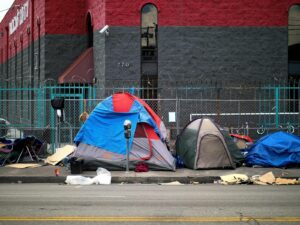 Welcome to a vital read that delves into a topic affecting not just individuals, but the very fabric of our communities. When most people think of drug abuse and addiction, focus often narrows down to personal turmoil. Yet, the truth is, the reverberations of these challenges reach far beyond the immediate circle of the user.
Welcome to a vital read that delves into a topic affecting not just individuals, but the very fabric of our communities. When most people think of drug abuse and addiction, focus often narrows down to personal turmoil. Yet, the truth is, the reverberations of these challenges reach far beyond the immediate circle of the user.
This article aims to widen the lens, exploring the extensive impact drug abuse has on society. Here, you will learn about the consequences of drug abuse in America, understand how it can often lead to tragic decisions like suicide, and digest some sobering statistics. We’ll also shed light on common signs of drug abuse, connecting the dots between personal battles and societal costs. Join us as we unpack this topic, equipping you with knowledge to appreciate the broader implications of drug addiction.
Society’s Burden: The Broader Impacts of Drug Abuse
The ripple effects of drug abuse extend far beyond the confines of an individual’s life, impacting society in multifaceted and profound ways. These impacts manifest as increased healthcare costs, lost productivity, and a burdened legal system. Hospitals and treatment centers see their resources stretched thin, catering to those in the throes of addiction and its complications. Similarly, workplaces experience a decline in productivity due to absenteeism and a decrease in employee performance – a silent drain on the economy’s vitality. Moreover, the legal system becomes overwhelmed with cases related to substance abuse, ranging from possession and distribution to driving under the influence. Each case not only represents a personal tragedy but also conveys the considerable strain drug abuse places on communal resources and public services, marking it as a substantial societal concern.
From Personal Struggle to Public Challenge: Consequences of Drug Abuse in America
 The consequences of drug abuse in America transcend individual suffering and sketch a deeply troubling picture of public health and safety concerns. Communities across the nation grapple with the fallout from increased crime rates, homelessness, and overburdened healthcare systems directly tied to the epidemic of substance abuse. The surge in drug-related offenses not only taxes the criminal justice system but also saps the sense of security within communities, fostering environments where fear and mistrust flourish. Furthermore, the American economy bears the weight of billions in healthcare costs and lost productivity annually, a testament to the far-reaching economic reverberations. Compounded, these issues highlight the pressing need for comprehensive strategies that address the root causes and wide-ranging consequences of drug abuse on a societal level.
The consequences of drug abuse in America transcend individual suffering and sketch a deeply troubling picture of public health and safety concerns. Communities across the nation grapple with the fallout from increased crime rates, homelessness, and overburdened healthcare systems directly tied to the epidemic of substance abuse. The surge in drug-related offenses not only taxes the criminal justice system but also saps the sense of security within communities, fostering environments where fear and mistrust flourish. Furthermore, the American economy bears the weight of billions in healthcare costs and lost productivity annually, a testament to the far-reaching economic reverberations. Compounded, these issues highlight the pressing need for comprehensive strategies that address the root causes and wide-ranging consequences of drug abuse on a societal level.
A Dark Path: How Drug Abuse Can Lead to Suicide
Navigating the stormy waters of drug abuse often leads individuals down a dangerous path where the risk of suicide looms large. The relationship between substance abuse and suicidal thoughts or actions is complex and multifaceted. Drugs can significantly amplify preexisting negative emotions, enveloping users in a shroud of despair that feels insurmountable. Furthermore, the impaired judgment that accompanies drug use can make permanent solutions to temporary problems seem like viable options. Withdrawal symptoms too, with their physical and psychological agony, might push someone to the edge, feeling as though there is no escape. Together, these factors create a perilous storm, where the hope of respite is drowned out by the overwhelming urges of addiction and its dire consequences, making it a critical area of concern for intervention and support.
By the Numbers: A Look at Drug Abuse Statistics
 The stark reality of drug abuse emerges through the cold precision of statistics, painting a vivid picture of its prevalence and impact. In recent years, the United States has seen an alarming surge in substance abuse cases, with opioids, methamphetamine, and prescription drugs at the forefront. These stats aren't just numbers—they represent lives disrupted, potential unfulfilled, and families torn apart. For instance, the National Institute on Drug Abuse reports millions of Americans battling substance use disorders, highlighting the epidemic's grip on society. Overdose deaths have also skyrocketed, signaling an urgent public health crisis. These statistics serve as a wake-up call, emphasizing the need for decisive action and comprehensive support systems to turn the tide against this growing menace. They underscore the importance of understanding the scale of the problem we face as a society.
The stark reality of drug abuse emerges through the cold precision of statistics, painting a vivid picture of its prevalence and impact. In recent years, the United States has seen an alarming surge in substance abuse cases, with opioids, methamphetamine, and prescription drugs at the forefront. These stats aren't just numbers—they represent lives disrupted, potential unfulfilled, and families torn apart. For instance, the National Institute on Drug Abuse reports millions of Americans battling substance use disorders, highlighting the epidemic's grip on society. Overdose deaths have also skyrocketed, signaling an urgent public health crisis. These statistics serve as a wake-up call, emphasizing the need for decisive action and comprehensive support systems to turn the tide against this growing menace. They underscore the importance of understanding the scale of the problem we face as a society.
Recognizing the Warning Signs: Symptoms of Drug Abuse
Identifying the symptoms of drug abuse early can be the key to preventing the slide from use into addiction. These signs can be subtle or glaringly obvious, ranging from sudden shifts in behavior to physical changes. Unexplained mood swings, withdrawal from social activities, and a drastic change in personal appearance can all be red flags. Additionally, a noticeable decline in performance at work or school, alongside uncharacteristic financial problems due to spending money on substances, are critical indicators. Physical symptoms may include changes in sleep patterns, weight loss or gain, and neglect of personal hygiene. Recognizing these symptoms not only in ourselves but also in loved ones can initiate the vital steps towards intervention and seeking help, setting the foundation for recovery and rehabilitation in the face of drug abuse.
Creating Awareness and Solutions: Combatting the Effects of Substance Abuse on Society
Confronting the pervasive issue of substance abuse in society demands collective action and heightened awareness. Education plays a pivotal role, equipping individuals with the knowledge to recognize the dangers of drug use and the signs of addiction. Communities must foster open conversations about substance abuse, eradicating the stigma that often silences those in need of help. Support networks, including accessible treatment centers and recovery programs, are crucial in offering lifelines to those grappling with addiction. Additionally, policy initiatives aimed at reducing the availability of illicit drugs while enhancing the quality of mental health services can create environments less conducive to substance abuse. By uniting efforts across these fronts, society can forge a powerful counterattack against the scourge of drug abuse, fostering healthier communities resilient to its detrimental impacts.
